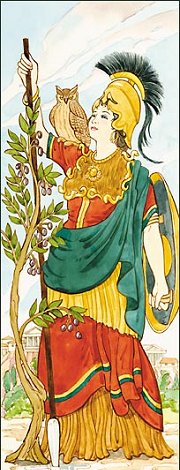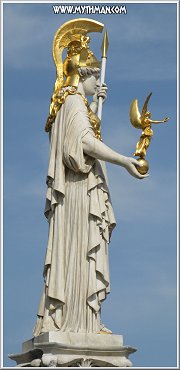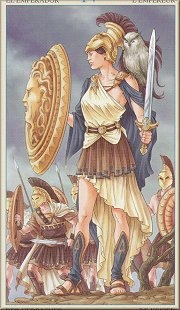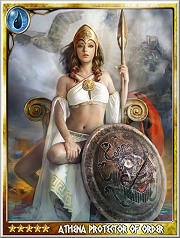
ATHENA
(c) Encyclopedia Britannica

ATHENA
CLICK TO ENLARGE

WAR GODDESS ATHENA
CLICK TO ENLARGE

ATHENA
PROTECTOR OF ORDER
CLICK TO ENLARGE
|
ATHENA PAGE FIVE
continued from page four
Athena promoted the internal prosperity of the city state, by
encouraging widespread agriculture and industry, and by
maintaining law and order in all public transactions.
She also was tasked with protecting the state from outside
enemies. In those cases she assumed the character of a warlike
divinity, though in a very different sense from reviled
Ares, god of war, and his hated attendants called Eris
(Discord), or Enyo (goddess of war, Bellona in Latin).
According to Homer Athena does not even bear arms, but borrows them from
Zeus when needed; she attempts to keep men from needless
slaughter when common sense demands it and even repels Ares's
savage love of war, thus conquering him.
Athena does not love war for its own sake, but simply on account
of the advantages to be gained by the State in engaging in it.
Wisely, she therefore supports only such warlike undertakings as
are begun with circumspection, and are more than likely to be
followed by advantageous results. Hers is a well-planned
strategy.
In times of war, towns, fortresses, and harbors are under her
special care, and as the sage goddess of war, she is also the
protector of all heroes who are distinguished by good judgment
and wise counsel, as well as for their strength and valor.
Examples of some such heroes, as previously mentioned, are
Hercules, Perseus, Bellerophon, Achilles, Diomedes, Jason and
Odysseus.
In the war of Zeus and the Olympians versus the Giants, brave
Athena assisted her father and Hercules with her wise counsel,
and also took an active part in it, for she buried the giant Enceladus under
the island of Sicily, and slew another giant named Pallas, not
to be confused with the best friend Pallas that she accidently
killed.
Athena slew the winged giant Pallas because he attempted to
violate her chastity. She then used his skin to craft her and
Zeus' Aegis, fastening his wings to her own feet.
In the Trojan war Athena sided with the more civilized Greeks,
though on their return home she unleashed severe storms upon
them, on account of the manner in which the Greek warrior
Ajax had mistreated the Trojan princess Cassandra in Athena's
temple. There is no doubt that Athena could be decisively
deadly.
As a goddess of war and the protector of heroes, Athena usually
appears in armor, with the aegis and a golden staff, with which
she bestows on her favorite subjects the qualities of youth and
majesty.
The character of Athena holds a middle place between the male
and female, whence she is called in an Orphic hymn arsên kai
thêlus (male and female), and hence also she is a virgin
divinity whose heart is invulnerable to the passion of love, and
who shuns matrimonial connections.
That's evident in the seer Teiresias, who was deprived of his
sight for having seen her in the bath, and even her fellow
Olympian god Hephaestus, who once unwisely tried to seduce
Athena and had to flee from her fury!
Athena was worshipped in all parts of Greece: from the ancient
towns on the lake Copais her worship was introduced at a very
early period into Attica, where she became the great national
divinity of the city and the country.
Here she was afterwards regarded as thea sôteira (savior
goddess), and the serpent, the symbol of perpetual
rejuvenation, was held as sacred to her.
The ancient sacrifices offered to Athena consisted of bulls,
sheep, rams, and cows. It should be noted that for the most part
only female animals were sacrificed to her, but no female lambs.
On a more morbid note, in the region of Ilion, Locrian maidens
or children are said to have been sacrificed to Athena every
year as an atonement for the atrocity committed by the Locrian
Ajax upon the aforementioned Cassandra; and these human
sacrifices continued to be offered to her down to B. C. 346.
In Athens, two great festivals were held in her honor annually.
One of them, the Panathenaea was the most important of all the
festivals in Greece.
Inaugurated by the mythical king Erichthonius, it was held on
the twenty-eighth of Hekatombaion (July). Starting in 566/5 B.C.
the Panathenaea was celebrated every four years, with great
ritual festivities.
It lasted twelve days, and there were many rites and sacrifices.
The most prominent of these was the so-called 'hecatomb'.
There were also competitions in music and athletics open to all
Greeks.
The sacrificed meat was distributed to the citizens in the Agora
area, which was the central city square. Another competition
included in the Great Panathenaea was for the pyrrhic dance:
armed men, from every age group, took part in this.
The night before the Great Panathenaea, there was a vigil, with
dancing by young men and girls. At sunrise on the twenty-eighth
of Hekatombaion - Athena's birthday - the torch-race started.
The object was to bring the new fire from the grove of Academus,
beyond the city walls, to the altar of Athena on the Acropolis.
There followed a grand procession, in which the whole citizen
population took part. Its starting-point was the Kerameikos; its
finishing-point was the Acropolis; and its purpose was to
transfer offerings to Athena, principally the sacred peplos (cloak)
destined to clothe the wooden image of Athena Polias, goddess of
the city.
Many competitions took place during the festival, with athletes
from other city-states taking part. The winner received as prize
a Panathenaic amphora filled with olive oil, and was crowned
with a branch of olive, Athena's sacred tree.
In addition, starting in 425 B.C., cities that were in some
sense dependencies or associates of Athens - Athenian colonies,
for instance, or allied towns - sent their representatives to
Athens with sacrificial animals and votive offerings.
The Great Panathenaea has justly been described as Athens', if
not Greece's, most important festival. It was not simply a
display of the Athenian hegemony's strength and superiority, it
was a symbol of the city's unity by virtue of the participation
in it of the whole Athenian population.
All in honor of the majestic Olympian goddess Athena.

[home][page
one][page two][page
three][page four][page
five]
|







